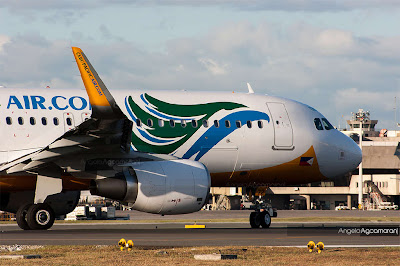Cebu Pacific: Create Open Skies with Japan
Cebu Pacific is using its position as one of the leading carriers in the Philippines to encourage the government to establish an open skies agreement with Japan to enable local carriers to increase flights between the two countries and to reverse the on-going decline in Japanese tourist arrivals.
 |
| Copyright Photo: Angelo Agcamaran/PPSG |
Talks to renegotiate the Philippines-Japan air agreement are scheduled to begin on September 11 in Tokyo. Cebu Pacific submitted a position paper to the Philippine Air Consultation Panel where it applauded the government's efforts to increase capacity at Ninoy Aquino International Airport. However, the airline also indicated that the lack of seat entitlements with other countries prevents any of that capacity from being maximized.
In order to increase frequency or launch new services to other countries, Philippine carriers must obtain seat entitlements from the respective country. But under an open skies agreement, rules governing international aviation are liberalized and government intervention is minimized to create a free market environment for the airline industry. Free market environments benefit airlines by removing restrictions on international route rights, the number of designated carriers, capacity and frequency.
In order to increase frequency or launch new services to other countries, Philippine carriers must obtain seat entitlements from the respective country. But under an open skies agreement, rules governing international aviation are liberalized and government intervention is minimized to create a free market environment for the airline industry. Free market environments benefit airlines by removing restrictions on international route rights, the number of designated carriers, capacity and frequency.
Cebu Pacific hopes to use an open skies agreement to expand its Japan operations which are presently limited to just three weekly flights between Manila and Osaka. "An open skies agreement with Japan will benefit local tourism and trade, especially since we believe Japan can rival South Korea when it comes to foreign tourist arrivals," said Candice Iyog, Vice President for Marketing & Distribution for Cebu Pacific. "Cebu Pacific plans to aggressively expand into Japan in the future. Aside from Japan being one of the Philippines' biggest trading partners, it is also home to 350,000 global Filipinos. Cebu Pacific's expansion in Japan will allow us to offer our trademark lowest fares to the Philippines to boost business and leisure traffic."
Foreign tourist arrivals from Japan have been on a gradual decline since 2006. The decline in arrivals has been attributed to a lack of additional seat entitlements. Data from the Department of Tourism indicates that visitation from Japan reached 412,000 in 2012. But it is believed that if a liberalized air agreement can be forged, Japan could dislodge South Korea as the primary source of tourists for the Philippines.
The air talks are set from September 11 to 13 in Tokyo. The last time such negotiations took place was in 2008. Philippine Airlines is the only other local carrier serving Japan controlling 43% of total seat capacity with its flights from Manila to Nagoya, Osaka, Tokyo, and Fukuoka. Other Philippine carriers including TigerAir and Zest-Air Asia have all expressed strong interest in serving the Japanese market.
Japan was once known as one of the most protective aviation sectors in the world but has since liberalized its policies having signed "open skies" agreements with Thailand, Malaysia, Singapore, Hong Kong, South Korea, and Taiwan among other countries. But if there is hope of creating an open skies agreement between Japan and the Philippines, the Philippine government will have to address its own protectionist policies.
The air talks are set from September 11 to 13 in Tokyo. The last time such negotiations took place was in 2008. Philippine Airlines is the only other local carrier serving Japan controlling 43% of total seat capacity with its flights from Manila to Nagoya, Osaka, Tokyo, and Fukuoka. Other Philippine carriers including TigerAir and Zest-Air Asia have all expressed strong interest in serving the Japanese market.
Japan was once known as one of the most protective aviation sectors in the world but has since liberalized its policies having signed "open skies" agreements with Thailand, Malaysia, Singapore, Hong Kong, South Korea, and Taiwan among other countries. But if there is hope of creating an open skies agreement between Japan and the Philippines, the Philippine government will have to address its own protectionist policies.







No comments